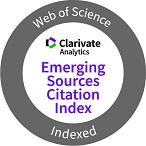“Fool me once, ...”: deception, morality and self-regeneration in decentralized markets
Keywords:
Markets, Deception, Morality, Purchasing decisions, Preferences, Rumour spreadingAbstract
Purpose. This paper aims to provide an overall review and assessment of the virtues and flaws of decentralized self-regulated markets, discussing in particular the extent to which deceiving attitudes by some market participants might be potentially diluted and contradicted.
Design/methodology/approach. To approach deception and morality in markets, the paper follows two paths. First, the relevant recent literature on the theme is reviewed, examined and debated, and second, one constructs a simulation model equipped with the required elements to discuss the immediate and longterm impacts of deceiving behaviour over market outcomes.
Findings. The discussion and the model allow for highlighting the main drivers of the purchasing decisions of consumers and for evaluating how they react to manipulating behaviour by firms in the market. Agents pursuing short-run gains through unfair market practices are likely to be punished as fooled agents spread the word about the malpractices they were allegedly subject to.
Research limitations/implications. Markets are complex entities, where large numbers of individual agents typically establish local and direct contact with one another. These agents differ in many respects and interact in unpredictable ways. Assembling a concise model capable of addressing such complexity is a difficult task. The framework proposed in this paper points in the intended direction.
Originality/value. The debate in this paper contributes to a stronger perception on the mechanisms that attribute robustness and vitality to markets.
Downloads
References
Akerlof, G.A. (1970), “The market for ‘lemons’: quality uncertainty and the market mechanism”, Quarterly Journal of Economics, Vol. 84 No. 3, pp. 488-500.
Akerlof, G.A. and Shiller, R.J. (2016), Phishing for Phools – The Economics of Manipulation and Deception, Princeton University Press, Princeton, NJ.
Banerjee, A., Yakovenko, V.M. and Di Matteo, T. (2006), “A study of the personal income distribution in Australia”, Physica A, Vol. 370 No. 1, pp. 54-59.
Basu, K. (2016), “Markets and manipulation: time for a paradigm shift?”, World Bank Policy research working paper N° 7653.
Bonroy, O. and Constantatos, C. (2015), “On the economics of labels: how their introduction affects the functioning of markets and the welfare of all participants”, American Journal of Agricultural Economics, Vol. 97 No. 1, pp. 239-259.
Bowles, S., Kirman, A. and Sethi, R. (2017), “Retrospectives: Friedrich Hayek and the market algorithm”, Journal of Economic Perspectives, Vol. 31 No. 3, pp. 215-230.
Dosis, A. (2016), “On signalling and screening in markets with asymmetric information”, HAL working paper N° 01285190.
Gerschlager, C. (2007), “Adam Smith’s account of self-deceit and informal institutions”, DULBEA working paper N° 7-10. RS.
Gruss, L. and and Piotti, G. (2010), “Blurring the lines: strategic deception and self-deception in markets”, MPIfG discussion paper N° 10/13.
Huo, L., Huang, P. and Guo, C.X. (2012), “Analyzing the dynamics of a rumor transmission model with incubation”, Discrete Dynamics in Nature and Society, p. 21.
Kaplan, S.N. and Rauh, J. (2013), “It’s the market: the broad-based rise in the return to top talent”, Journal of Economic Perspectives, Vol. 27 No. 3, pp. 35-56.
Kaplow, L. and Shavell, S. (2007), “Moral rules, the moral sentiments, and behavior: toward a theory of an optimal moral system”, Journal of Political Economy, Vol. 115 No. 3, pp. 494-514.
Lindstrom, M. (2008), Buyology: Truth and Lies about Why we Buy, Doubleday, New York, NY.
Manner, M. and Gowdy, J. (2010), “The evolution of social and moral behavior: evolutionary insights for public policy”, Ecological Economics, Vol. 69 No. 4, pp. 753-761.
Nekovee, M., Moreno, Y., Bianconi, G. and Marsili, M. (2007), “Theory of rumor spreading in complex social networks”, Physica A, Vol. 374 No. 1, pp. 457-470.
Paganelli, M.P. (2010), “The moralizing role of distance in Adam Smith: the theory of moral sentiments as possible praise of commerce”, History of Political Economy, Vol. 42 No. 3, pp. 425-441.
Perri, T. (2016), “Lemons and loons”, Review of Behavioral Economics, Vol. 3, pp. 173-188.
Ramiah, V. and Moosa, I.A. (2015), “Neoclassical finance, behavioral finance and noise traders: a review and assessment of the literature”, International Review of Financial Analysis, Vol. 41, pp. 89-100.
Wang, Y.Q., Yang, X.Y., Han, Y.L. and Wang, X.A. (2013), “Rumor spreading model with trust mechanism in complex social networks”, Communications in Theoretical Physics, Vol. 59 No. 4, pp. 510-516.
White, M. (2010), “Adam smith and Immanuel Kant: on markets, duties, and moral sentiments”, Forum for Social Economics, Vol. 39 No. 1, pp. 53-60.
Witztum, A. (2010), “Interdependence, the invisible hand, and equilibrium in Adam Smith”, History of Political Economy, Vol. 42 No. 1, pp. 155-192.
Zak, P.J. (2011), “Moral markets”, Journal of Economic Behavior and Organization, Vol. 77 No. 2, pp. 212-233.
Zanette, D.H. (2002), “Dynamics of rumor propagation on small-world networks”, Physical Review E, Vol. 65, p. 041908.
Zhang, T. and Zhang, D. (2007), “Agent-based simulation of consumer purchase decision-making and the decoy effect”, Journal of Business Research, Vol. 60 No. 8, pp. 912-922.
Zhou, X., Gibler, K. and Zahirovic-Herbert, V. (2015), “Asymmetric buyer information influence on price in a homogeneous housing market”, Urban Studies, Vol. 52 No. 5, pp. 891-905.
Downloads
Published
How to Cite
Issue
Section
License
Copyright (c) 2021 Journal of Economics, Finance and Administrative Science

This work is licensed under a Creative Commons Attribution 4.0 International License.











